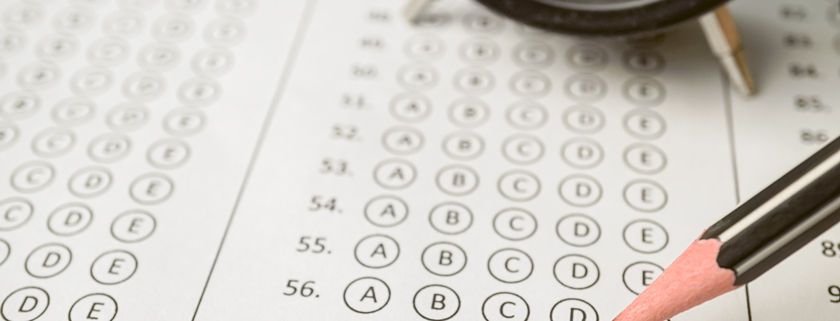The ACT is both a marathon AND a sprint – it’s a long test (around 3 hours) that you have to move through very quickly. You have less than one minute per question on the ACT – and as little as 36 seconds per question on the English section of the test – which is why a lot of students find ACT time management to be the biggest challenge.
So how can you tackle the ACT without running out of time?
Answer the easiest questions first.
The easiest questions will give you the biggest bang for your buck. There’s no reason you have to do the questions in the order the test makers present them.
For instance, on the Reading section, flip through the section quickly to identify the passages you think will be the easiest for you to tackle. For example, maybe science is your jam – start your reading section with the Natural Science passage instead of whichever passage actually comes first in the test booklet. The same applies to the English and Science sections – go for the passages you think you can read through and absorb the most quickly. On the Math section, tackle the questions in order; on your first pass, only tackle those questions that you immediately know how to solve and skip those questions that you’re not quite sure about.
When you take each question in order, you risk wasting time on hard questions that you may or may not answer correctly, which means you might run out of time before you get to some of the easier questions that you definitely would have gotten right. Using this method, you make sure that you get to all of the easiest questions – the ones you know you’ll get right – and if you do run out of time, any questions you didn’t get to will be the questions that you’re less likely to get right anyway.
A warning: This method requires that you skip around, so you’ll have to be super careful not to make any mistakes on your bubble sheet. The more you practice this method, the better you’ll get at bubbling your answers quickly and accurately.
Wear a good, old-fashioned watch.
The proctor should make a few remaining time announcements, but it’s a lot more helpful if you know how much time you have as you work through the test. You’re not allowed to have digital timers, phones, smartwatches, or watches with alarms – but you’re definitely allowed to wear an old-fashioned, boring watch with no bells and whistles.
Take note of the starting time for each section and keep an eye on your remaining time as you work through the section. Consider breaking each section down to keep your pacing steady. So, for example, on the Reading section, give yourself just 8 minutes per passage. After 8 minutes, go to the next passage, whether you’re done yet or not, and at the end, you’ll still have about 3 minutes left to go back and answer any questions you didn’t get to.
Lots of timed practice.
The more you practice, the better your ACT time management. Every time you do practice sections or practice tests, time yourself. Take note of the kinds of questions that are time-suckers for you. Maybe you find that the lengthier word problems on the Math section take up the biggest chunk of your time. By knowing this, you know that you should save these problems for last when you take the test, and you can focus your practice on speeding up your word problem skills.
Leave yourself 30 seconds to guess on the remaining questions.
There is no guessing penalty on the ACT, so you shouldn’t leave any questions blank. A completely random guess gives you a one in four chance of getting the question right – a blank question is always going to be wrong. Give yourself about 30 seconds at the end of each section to guess on any questions you’ve left blank. If you can eliminate any answer choices without spending more than a couple of seconds on the question, that’s great – every answer choice you eliminate improves your chances of guessing correctly.
Focus prep efforts on high-yield items.
Certain topics are always going to come up on every test. For example, on the English section, there are always going to be about 10 punctuation questions. If you know your punctuation rules inside and out, these 10 questions will always be quick and easy to answer. Items that reliably appear on every ACT and that are a little less complex to master are high-yield items – they’ll give you a good return on your test prep investment.
Know your calculator.
The calculator is supposed to be a tool that helps you to succeed on the math section, but if you’re using a brand new calculator, you risk wasting more time trying to figure out how to get the calculator to do what you want than the calculator will actually save you. A key to ACT time management is to be sure that you do several practice math sections with the same calculator you’ll use on test day, and make your that your chosen calculator meets the ACT’s calculator policies.
Know what to expect.
If you already know all of the directions on the test, the layout of each section, and the types of questions you can expect to see on each section, you’ll save yourself precious seconds by being able to skip reading the directions on test day and by being able to better anticipate which questions you can answer the most quickly and which ones are going to take up a little more time. The best way to accomplish this is to practice, practice, practice! And remember that timed practice is always more valuable than untimed practice.
Be sure to check out our YouTube video too, where one of our educational gurus gives our Top 3 Time Management Tips for the ACT.
Now that you have an understanding of time management, could you use some specific test prep advice? Check out our post on ACT study tips.









